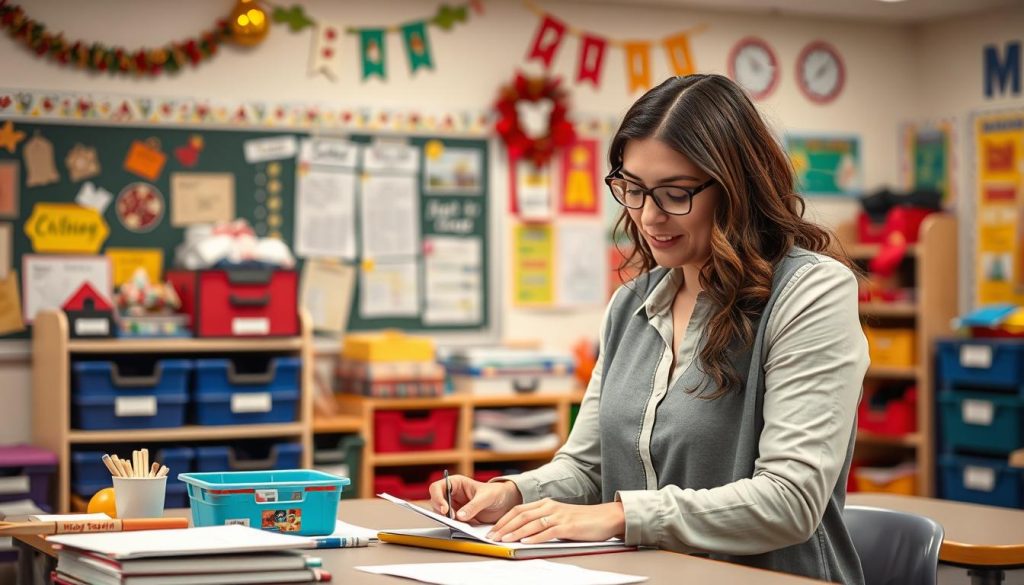Why Every Teacher Needs a Guide to Self-Care
Teaching is one of the most rewarding professions—and one of the most demanding. According to a 2017 American Federation of Teachers survey, 61% of teachers reported that their work is “always” or “often” stressful. This chronic stress can lead to burnout, compassion fatigue, and even health problems if not addressed.
Self-care isn’t selfish—it’s essential maintenance for your most important teaching tool: yourself. Just as you wouldn’t expect your car to run without regular maintenance, your mind and body need consistent care to perform at their best. Developing teacher skills in stress management is just as important as mastering curriculum design or classroom management.
When you neglect self-care, you risk:
- Decreased effectiveness in the classroom
- Reduced patience with challenging students
- Diminished creativity and problem-solving abilities
- Weakened immune system and increased sick days
- Strained relationships with colleagues and loved ones
Conversely, when you prioritize self-care, you cultivate resilience—the ability to bounce back from challenges—which is among the most valuable teacher skills you can develop. This Guide to Self-Care will help you build sustainable practices that support your wellbeing throughout your teaching career.
Enhance Your Teacher Skills Through Self-Care
Discover courses specifically designed to help educators develop resilience and wellbeing strategies that improve classroom effectiveness.
Physical Guide to Self-Care for Educators

Physical wellbeing forms the foundation of effective teaching. When your body feels good, you have more energy to engage with students and develop your teacher skills. Yet many educators neglect their physical needs, putting lesson planning and grading ahead of exercise, proper nutrition, and rest.
Quick Physical Self-Care Strategies for Busy Teachers
Movement Matters
Finding time for exercise doesn’t require a gym membership or hour-long workouts. Research shows that even short bursts of movement can boost energy and mental clarity—essential teacher skills for classroom management.
- Take a 10-minute walk during lunch or prep periods
- Do simple stretches between classes to reduce tension
- Try “deskercises”—exercises you can do at your desk
- Lead your students in brief movement breaks (benefits everyone!)
Nutrition for Sustained Energy
The foods you eat directly impact your energy levels and cognitive function. Planning ahead is a key teacher skill that applies to nutrition too.
- Prep easy-to-grab healthy snacks for your classroom
- Stay hydrated—keep a water bottle at your desk
- Avoid the temptation of breakroom treats by bringing satisfying alternatives
- Consider batch cooking on weekends to ensure healthy weekday meals
Rest and Recovery: The Unsung Heroes of Teaching Excellence
Sleep isn’t a luxury—it’s a biological necessity that directly impacts your teacher skills. According to the Sleep Foundation, adults need 7-9 hours of quality sleep for optimal cognitive function, emotional regulation, and immune system support.
Teacher Quick Tip: Create a “wind-down” routine to signal to your body that it’s time to transition from teacher-mode to rest-mode. This might include putting away work materials, enjoying a cup of herbal tea, or reading something unrelated to education for 15 minutes before bed.
Remember that physical self-care isn’t about perfection—it’s about making small, consistent choices that support your wellbeing. Each healthy choice is an investment in your teaching practice and an opportunity to model positive habits for your students.
Mental Health Guide to Self-Care for Teachers

Teaching demands extraordinary mental and emotional resources. Every day, you make hundreds of decisions, manage diverse personalities, and navigate complex social dynamics—all while maintaining a positive, supportive presence. This Guide to Self-Care emphasizes that nurturing your mental health isn’t optional; it’s essential for sustainable teaching.
Mindfulness: A Powerful Teacher Skill
Mindfulness—the practice of bringing non-judgmental awareness to the present moment—is among the most valuable teacher skills you can develop. Research shows that regular mindfulness practice can reduce stress, improve focus, and enhance emotional regulation.
5-Minute Mindfulness Practices
- Morning intention setting before students arrive
- Mindful breathing during transitions between classes
- Sensory awareness breaks (notice 5 things you can see, 4 things you can touch, etc.)
- Gratitude practice during your commute home
Emotional Regulation Strategies
- Name your emotions to tame them
- Use the “pause button” technique before responding to triggers
- Practice self-compassion when lessons don’t go as planned
- Maintain a “wins journal” to document positive moments
Boundaries: The Foundation of Sustainable Teaching
Setting healthy boundaries is a crucial teacher skill that protects your mental wellbeing. Many educators struggle with boundary-setting because their identity is so closely tied to being helpful and available. However, without boundaries, burnout becomes inevitable.
“Almost everything will work again if you unplug it for a few minutes, including you.”
Anne Lamott
Consider these boundary-setting practices:
- Designate specific times for checking email (not first thing in the morning or last thing at night)
- Create a dedicated workspace at home that you can physically leave
- Establish clear communication protocols with parents
- Practice saying “no” or “not right now” to additional responsibilities
Master the Art of Self-Care
Our specialized course helps educators establish healthy boundaries without compromising their effectiveness or compassion.
Professional Guide to Self-Care in the Classroom

Professional self-care involves nurturing your identity as an educator while preventing burnout. This aspect of your Guide to Self-Care focuses on sustainable teaching practices that preserve your passion while enhancing your teacher skills.
Efficiency Without Exhaustion
Working smarter, not harder, is a critical teacher skill that preserves your energy for what matters most. Consider these strategies:
Time Management Techniques
- Use the Pomodoro technique (25 minutes of focused work, 5-minute break)
- Batch similar tasks (grading, email, planning) for efficiency
- Identify your peak energy times and schedule demanding tasks accordingly
- Create templates for recurring communications and assignments
Sustainable Grading Practices
- Implement selective grading (not every assignment needs detailed feedback)
- Use rubrics to streamline assessment
- Try audio feedback instead of written comments
- Incorporate peer review and self-assessment
Professional Development That Energizes
Not all professional development depletes your energy—the right opportunities can actually rejuvenate your practice and enhance your teacher skills. This Guide to Self-Care encourages you to seek growth opportunities that align with your interests and teaching philosophy.
- Join or form a teacher book club focused on topics you’re passionate about
- Connect with online professional learning communities that energize rather than drain
- Pursue certifications or courses that genuinely interest you
- Consider mentoring or being mentored—relationships that provide mutual support
Did you know? Many schools and districts will reimburse teachers for professional development courses. Check with your administration about funding opportunities for courses that enhance your teacher skills while supporting your wellbeing.
Remember that investing in your professional growth is a form of self-care when it aligns with your values and interests. The right professional development can reignite your passion for teaching and introduce you to supportive colleagues who share your commitment to education.
Professional Development That Puts You First
Explore our teacher-centered courses designed to enhance your classroom effectiveness while honoring your need for balance.
Spiritual Guide to Self-Care for Educator Wellbeing
Spiritual self-care involves connecting with what gives your life meaning and purpose beyond the classroom. This doesn’t necessarily involve religious practice (though it can); rather, it’s about nurturing your inner life and maintaining perspective on your teaching journey.

Finding Meaning in Your Teaching Practice
Connecting with your “why”—the deeper purpose that drew you to education—is a powerful teacher skill that sustains motivation during challenging times. This Guide to Self-Care encourages regular reflection on the impact of your work.
- Keep a “victory file” of meaningful moments, student notes, and parent appreciation
- Take time to celebrate small wins and student growth
- Identify your core values as an educator and reflect on how they manifest in your teaching
- Connect your daily tasks to your larger educational philosophy
Practices for Inner Peace
Cultivating inner calm helps you respond rather than react to classroom challenges. Consider these practices:
Reflection Rituals
- Morning journaling to set intentions for the day
- Evening reflection on moments of connection or growth
- Weekend review of what went well and what you learned
- Annual teaching philosophy revisit and refinement
Nature Connection
- Take short walks outdoors between classes or during lunch
- Bring natural elements into your classroom
- Plan outdoor lessons when possible
- Use nature imagery during guided relaxation with students
Reflection Prompt: What moments in your teaching career have felt most meaningful? What conditions were present that made those moments possible? How might you create more opportunities for similar experiences?
Spiritual self-care also involves accepting that you cannot control everything in your classroom or school. Developing the teacher skill of discernment—knowing what you can change and what you must accept—preserves your energy for where you can make the most difference.
Seasonal Guide to Self-Care Throughout the School Year
Different phases of the academic year present unique challenges and opportunities for teacher self-care. This section of your Guide to Self-Care offers season-specific strategies to support your wellbeing throughout the school calendar.

Back-to-School Season: Setting Sustainable Patterns
The beginning of the school year offers a fresh start for establishing self-care routines. Use this energy to develop teacher skills in planning and boundary-setting that will serve you all year.
- Create templates for recurring tasks to save time throughout the year
- Establish clear communication protocols with students and families
- Set up your classroom to minimize physical strain
- Schedule self-care non-negotiables in your calendar
Mid-Year Slump: Maintaining Momentum
The middle months of the school year often bring fatigue and decreased motivation. This Guide to Self-Care recommends these strategies for the challenging middle stretch:
- Revisit and possibly revise your goals to maintain motivation
- Plan something to look forward to each week
- Connect with colleagues for mutual encouragement
- Try something new in your teaching to reignite your enthusiasm
End-of-Year Marathon: Finishing Strong
The final weeks of school demand intense energy while you’re likely at your most depleted. These teacher skills help you finish with integrity:
- Prioritize ruthlessly—identify what must be done versus what would be nice
- Increase your self-care rather than abandoning it when busy
- Celebrate accomplishments with students and colleagues
- Plan your summer restoration in advance
Summer: Intentional Restoration
Summer offers a precious opportunity for deeper renewal. This Guide to Self-Care encourages intentional use of this time:
- Allow a true break before diving into next year’s planning
- Pursue professional development that energizes rather than depletes
- Reconnect with non-teaching aspects of your identity
- Reflect on the past year and set intentions for growth
Summer Learning That Restores
Our summer courses are designed to enhance your teacher skills while honoring your need for rest and renewal.
Creating Your Personalized Guide to Self-Care
The most effective self-care plan is one tailored to your unique needs, preferences, and circumstances. This section helps you develop teacher skills in self-assessment and planning to create a sustainable approach to wellbeing.

Self-Assessment: Understanding Your Needs
Begin by honestly evaluating your current wellbeing across different dimensions:
| Dimension | Signs of Depletion | Signs of Wellbeing | Your Current Status (1-10) |
| Physical | Fatigue, frequent illness, tension | Energy, stamina, physical comfort | ___ |
| Mental | Forgetfulness, indecision, worry | Clarity, focus, creative thinking | ___ |
| Emotional | Irritability, numbness, mood swings | Emotional awareness, regulation, joy | ___ |
| Social | Isolation, conflict, disconnection | Meaningful connections, support | ___ |
| Professional | Cynicism, ineffectiveness, apathy | Purpose, competence, growth | ___ |
Designing Your Personal Self-Care Protocol
Based on your assessment, create a personalized Guide to Self-Care that addresses your specific needs:
Daily Practices (5-15 minutes)
- Morning intention setting
- Midday reset (deep breathing, stretching)
- Evening reflection or gratitude practice
- Physical movement, however brief
Weekly Practices (30-60 minutes)
- Connection with supportive colleague or friend
- Nature time or other restorative activity
- Review of the week’s victories and challenges
- Planning for the week ahead with self-care scheduled
Implementation: Making It Happen
Having a plan is just the beginning—implementation is where many self-care intentions falter. These teacher skills help turn plans into consistent practice:
- Start small—one 5-minute practice consistently is better than an ambitious plan abandoned
- Link new self-care habits to existing routines (e.g., deep breathing after checking email)
- Use visual reminders in your workspace
- Find an accountability partner who shares your commitment to wellbeing
- Track your self-care to build momentum and motivation
Remember: Self-care isn’t a one-size-fits-all prescription. What works for your colleagues may not work for you. Trust your own experience and adjust your Guide to Self-Care as needed.
The most important teacher skill in self-care is self-compassion. There will be days when your plan falls apart—that’s when you need self-care most. Treat yourself with the same kindness you would offer a struggling student, and begin again.
Overcoming Obstacles to Your Guide to Self-Care
Even with the best intentions, teachers face significant barriers to consistent self-care. This section addresses common obstacles and offers practical solutions to maintain your wellbeing practice.

Common Barriers and Solutions
“I don’t have time for self-care.”
Time constraints are the most frequently cited barrier to teacher self-care. However, effective self-care doesn’t always require large time blocks:
- Integrate micro-practices (1-3 minutes) throughout your day
- Reframe existing activities through a self-care lens (e.g., mindful commuting)
- Audit your schedule for time leaks (social media, unnecessary meetings)
- Remember: time invested in self-care improves efficiency and effectiveness
“I feel guilty prioritizing myself.”
Many teachers struggle with guilt when they put their needs on the to-do list. To overcome this barrier:
- Recognize that your wellbeing directly impacts your teaching quality
- Consider the modeling you provide for students about healthy boundaries
- Reframe self-care as professional responsibility rather than indulgence
- Start with self-care practices that directly enhance your teacher skills
“School culture doesn’t support self-care.”
Unsupportive school environments can undermine individual self-care efforts. Consider these approaches:
- Find like-minded colleagues to create a micro-culture of wellbeing
- Practice boundary-setting even when it’s not the norm
- Advocate for structural changes that support teacher wellbeing
- Protect your personal self-care practices even if the school culture doesn’t change
“I’m already burned out and don’t have energy for self-care.”
When you’re already depleted, even self-care can feel like another demand. In these cases:
- Focus first on restorative practices that require minimal effort
- Seek support from healthcare providers if burnout is severe
- Simplify your self-care plan to just one or two essential practices
- Consider whether structural changes are needed in your work situation
Building Resilience Through Self-Care
Consistent self-care builds resilience—the ability to bounce back from challenges—which is among the most valuable teacher skills you can develop. This Guide to Self-Care emphasizes that resilience isn’t about never struggling; it’s about having the tools to recover when you do.
“Self-care is not self-indulgence, it is self-preservation, and that is an act of political warfare.”
Audre Lorde
By prioritizing your wellbeing, you’re not just sustaining your teaching career—you’re making a statement about the value of educators and modeling healthy boundaries for your students and colleagues.
Transform Your Teaching Through Self-Care
Our specialized courses help you develop the teacher skills needed to thrive, not just survive, in education.
Conclusion: Your Ongoing Guide to Self-Care
Self-care isn’t a destination but a journey—one that evolves as your needs, circumstances, and teacher skills develop. This Guide to Self-Care is designed to be revisited regularly as you navigate the rewards and challenges of your teaching career.
Remember that small, consistent actions have more impact than occasional grand gestures. By integrating self-care into your daily routine, you’re making a powerful commitment to your wellbeing and professional longevity.
As you implement these strategies, pay attention to what works for you. Your Guide to Self-Care should be as unique as your teaching style—authentic, responsive, and aligned with your values and needs.
Most importantly, approach self-care with the same compassion you show your students. Progress isn’t linear, and there will be days when your self-care practice falters. When that happens, simply begin again with kindness.
Your wellbeing matters—not just for your sake, but for your students, colleagues, loved ones, and the future of education. By prioritizing self-care, you’re contributing to a healthier, more sustainable teaching profession where dedicated educators can thrive for years to come.
Continue Your Self-Care Journey
Discover resources specifically designed to support K12 teachers in developing sustainable self-care practices and essential teacher skills.





Social Guide to Self-Care for Teaching Professionals
Teaching can be surprisingly isolating despite being surrounded by people all day. This section of your Guide to Self-Care focuses on nurturing meaningful connections that support your wellbeing and enhance your teacher skills through collaboration and community.
Building Your Teacher Support Network
Strong professional relationships are essential for both emotional support and pedagogical growth. Consider these strategies for cultivating your support network:
“Alone we can do so little; together we can do so much.”
Helen Keller
Balancing School and Personal Relationships
Maintaining connections outside the education world provides perspective and prevents your identity from becoming solely defined by your profession. This balance is a crucial teacher skill for long-term wellbeing.
Nurturing Non-School Relationships
Digital Connection Without Overwhelm
Remember that quality matters more than quantity when it comes to social connections. A few deep, authentic relationships will do more for your wellbeing than numerous surface-level interactions. This Guide to Self-Care encourages you to invest in relationships that leave you feeling energized rather than depleted.